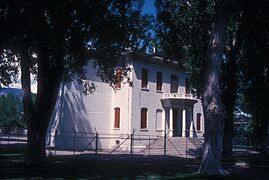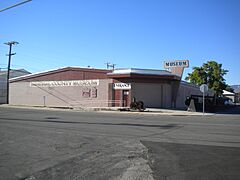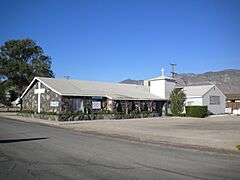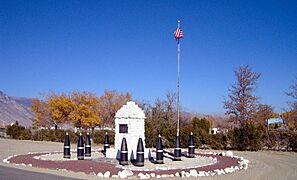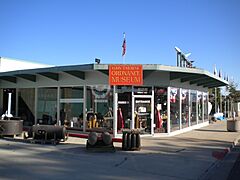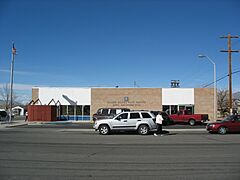Hawthorne, Nevada facts for kids
Quick facts for kids
Hawthorne, Nevada
|
|
|---|---|
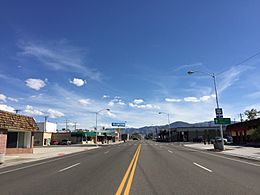
E Street (U.S. Route 95) in downtown Hawthorne
|
|
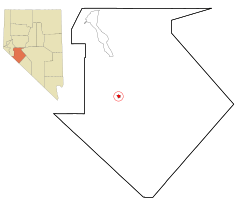
Location in Mineral County and the state of Nevada
|
|
| Country | United States |
| State | Nevada |
| County | Mineral |
| Founded | 1880 |
| Named for | William Hawthorne |
| Area | |
| • Total | 1.76 sq mi (4.56 km2) |
| • Land | 1.76 sq mi (4.56 km2) |
| • Water | 0.00 sq mi (0.00 km2) |
| Elevation | 4,331 ft (1,320 m) |
| Population
(2020)
|
|
| • Total | 3,118 |
| • Density | 1,772.60/sq mi (684.39/km2) |
| Time zone | UTC−8 (PST) |
| • Summer (DST) | UTC−7 (PDT) |
| ZIP code |
89415
|
| Area code(s) | 775 |
| FIPS code | 32-31300 |
| GNIS feature ID | 0848558 |
| Reference #: | 60 |
Hawthorne is a small community in Mineral County, Nevada, United States. It's a place where the government keeps track of the population, called a census-designated place (CDP). In 2020, about 3,118 people lived there. Hawthorne is also the main town, or county seat, of Mineral County. A big part of the town's economy comes from the nearby Hawthorne Army Depot.
Contents
History of Hawthorne
The first people to settle permanently in Hawthorne arrived in 1880.
How Hawthorne Started
In 1880, a man named H. M. Yerington chose the spot for Hawthorne. He was the president of the Carson and Colorado Railroad Company. He wanted a place where the new railroad could divide and distribute goods.
The chosen spot was close to Knapp's Station and Ferry Landing. This was an important stop on the busy Esmeralda Toll Road. New roads were built from Hawthorne to all the mining areas nearby.
Naming the Town
H. M. Yerington named the new town "Hawthorne" after a friend. His friend was a lumberman, rancher, and law enforcement officer in Carson City. The very first train arrived in Hawthorne on April 14, 1881. It brought people who wanted to buy land in the new town.
Hawthorne as a County Seat
In 1883, Hawthorne became the county seat for Esmeralda County. This meant it was the main town for government business. Later, it lost this role to a booming town called Goldfield. But in 1911, Hawthorne became a county seat again, this time for the new Mineral County.
Geography of Hawthorne
Hawthorne is located in the western part of Mineral County. It is almost completely surrounded by the Hawthorne Army Depot. To the northwest, you can find the remains of a community called Babbitt.
Roads and Nearby Places
U.S. Route 95 goes right through Hawthorne. If you go north on this road, you'll reach Fallon in about 71 miles (114 km). If you go southeast, you'll get to Tonopah in about 103 miles (166 km). Another road, Nevada State Route 359, goes southwest from Hawthorne for 32 miles (51 km) to the California border. From there, California State Route 167 continues to Mono City.
Lakes and Mountains
Hawthorne covers about 1.76 square miles (4.56 km2) of land. There is no water within the town's official area. Walker Lake is about 7 miles (11 km) north of Hawthorne. The Wassuk Range of mountains stands tall to the west of the town. The highest point in this mountain range, and in Mineral County, is Mount Grant. It is about 11,239 feet (3,426 m) high and is located 9 miles (14 km) northwest of Hawthorne.
Climate
Hawthorne has a climate with warm summers and cool winters. Here's a look at the weather:
| Climate data for Hawthorne, Nevada, 1991–2020 normals, extremes 1954–present | |||||||||||||
|---|---|---|---|---|---|---|---|---|---|---|---|---|---|
| Month | Jan | Feb | Mar | Apr | May | Jun | Jul | Aug | Sep | Oct | Nov | Dec | Year |
| Record high °F (°C) | 73 (23) |
75 (24) |
86 (30) |
94 (34) |
99 (37) |
105 (41) |
110 (43) |
105 (41) |
105 (41) |
93 (34) |
80 (27) |
73 (23) |
110 (43) |
| Mean maximum °F (°C) | 62.8 (17.1) |
66.9 (19.4) |
76.0 (24.4) |
82.6 (28.1) |
91.5 (33.1) |
98.6 (37.0) |
102.9 (39.4) |
100.8 (38.2) |
95.8 (35.4) |
86.1 (30.1) |
72.5 (22.5) |
62.6 (17.0) |
103.4 (39.7) |
| Mean daily maximum °F (°C) | 47.8 (8.8) |
52.9 (11.6) |
61.7 (16.5) |
67.4 (19.7) |
77.0 (25.0) |
86.9 (30.5) |
95.4 (35.2) |
93.1 (33.9) |
84.5 (29.2) |
71.2 (21.8) |
56.7 (13.7) |
47.2 (8.4) |
70.2 (21.2) |
| Daily mean °F (°C) | 37.0 (2.8) |
41.3 (5.2) |
48.5 (9.2) |
53.4 (11.9) |
62.4 (16.9) |
71.5 (21.9) |
79.4 (26.3) |
77.3 (25.2) |
69.1 (20.6) |
56.7 (13.7) |
44.5 (6.9) |
36.5 (2.5) |
56.5 (13.6) |
| Mean daily minimum °F (°C) | 26.2 (−3.2) |
29.7 (−1.3) |
35.2 (1.8) |
39.3 (4.1) |
47.8 (8.8) |
56.0 (13.3) |
63.4 (17.4) |
61.5 (16.4) |
53.7 (12.1) |
42.1 (5.6) |
32.3 (0.2) |
25.8 (−3.4) |
42.8 (6.0) |
| Mean minimum °F (°C) | 13.5 (−10.3) |
16.9 (−8.4) |
22.0 (−5.6) |
27.1 (−2.7) |
34.9 (1.6) |
41.7 (5.4) |
54.9 (12.7) |
53.1 (11.7) |
43.0 (6.1) |
28.9 (−1.7) |
18.5 (−7.5) |
12.4 (−10.9) |
9.3 (−12.6) |
| Record low °F (°C) | −3 (−19) |
2 (−17) |
14 (−10) |
16 (−9) |
25 (−4) |
34 (1) |
44 (7) |
43 (6) |
36 (2) |
15 (−9) |
6 (−14) |
−2 (−19) |
−3 (−19) |
| Average precipitation inches (mm) | 0.43 (11) |
0.35 (8.9) |
0.47 (12) |
0.31 (7.9) |
0.66 (17) |
0.27 (6.9) |
0.35 (8.9) |
0.19 (4.8) |
0.11 (2.8) |
0.35 (8.9) |
0.42 (11) |
0.24 (6.1) |
4.15 (106.2) |
| Average snowfall inches (cm) | 0.3 (0.76) |
0.2 (0.51) |
0.1 (0.25) |
0.0 (0.0) |
0.0 (0.0) |
0.0 (0.0) |
0.0 (0.0) |
0.0 (0.0) |
0.0 (0.0) |
0.0 (0.0) |
0.5 (1.3) |
0.1 (0.25) |
1.2 (3.07) |
| Average precipitation days (≥ 0.01 in) | 2.8 | 2.4 | 2.3 | 2.1 | 3.0 | 1.6 | 2.1 | 1.6 | 1.2 | 1.6 | 2.2 | 2.5 | 25.4 |
| Average snowy days (≥ 0.1 in) | 0.3 | 0.2 | 0.2 | 0.0 | 0.0 | 0.0 | 0.0 | 0.0 | 0.0 | 0.0 | 0.1 | 0.1 | 0.9 |
| Source 1: NOAA | |||||||||||||
| Source 2: National Weather Service | |||||||||||||
Population of Hawthorne
The population of Hawthorne has changed over the years. Here's how many people have lived there during different census counts:
| Historical population | |||
|---|---|---|---|
| Census | Pop. | %± | |
| 1950 | 1,861 | — | |
| 1960 | 2,838 | 52.5% | |
| 1970 | 3,539 | 24.7% | |
| 1980 | 3,741 | 5.7% | |
| 1990 | 4,162 | 11.3% | |
| 2000 | 3,311 | −20.4% | |
| 2010 | 3,269 | −1.3% | |
| 2020 | 3,118 | −4.6% | |
| U.S. Decennial Census | |||
In 2000, there were 3,311 people living in Hawthorne. The average number of people per household was about 2.25. The median age of people in Hawthorne was 44 years old.
Education in Hawthorne
Hawthorne has a public library called the Mineral County Library. It's a great place to find books and learn new things!
Places to Visit in Hawthorne
If you visit Hawthorne, here are some interesting places you might want to see:
- Hawthorne Army Depot
- Hawthorne Ordnance Museum
- Mineral County Museum
- Walker Lake
Gallery
See also
 In Spanish: Hawthorne (Nevada) para niños
In Spanish: Hawthorne (Nevada) para niños



